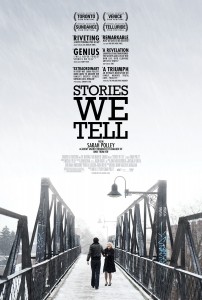That image, above, is a line from the letter John Adams wrote his wife on July 3, 1776.
The previous day, the Second Continental Congress approved the resolution of independence. In this letter, Adams wrote, “The Second Day of July 1776, will be the most memorable Epocha, in the History of America.”
It appears many historians believe the Declaration of Independence was signed on August 2nd.
Yet we celebrate Independence Day in the United States on July 4th. Not the date of our country’s independence. Not the date of the signing of the Declaration. But the adoption of it.
What’s also interesting is that, years later, both Jefferson and Adams wrote of that time spent drafting the Declaration; however, their stories are contradictory.
It seems the best stories are messy. They’re remembered and re-told in different ways.
A Film Worth Watching
This past weekend, I watched Sarah Polley’s film, Stories We Tell.
Have you seen it? It’s incredible.
I promise not to divulge any spoilers, but it’s a look at how we remember and retell the past. It’s about how a group can experience the same event and recall it differently. It’s told through the story of Polley’s mother.
It is masterful storytelling.
The big aha moment for me was when Polley’s dad reads an extended quote from Margaret Atwood’s novel, Alias Grace:
When you’re in the middle of a story, it isn’t a story at all. But only a confusion. A dark, roaring. A blindness. It’s only afterwards that it becomes anything like a story, when you’re telling it to yourself or someone else.”
Stories must be told.
They exist in the past or future, never in the present. The present is simply fragments of information.
Think about what you’ve done so far today. Woke up. Maybe sipped a cup of coffee while checking email or reading the news. Got ready and went to the office. Or local café. Had a meeting.
This isn’t a story. It’s fragments.
Think about the three most important and impactful narratives told to us and by us:
- Genesis (or Creation) Narratives — These tell how something came to be. The founding of America is a Genesis narrative. So is the story of Steve Wozniak building the Apple I computer in Steve Jobs’ parents’ garage.
- Quest (or Promised Land) Narratives — These tell of a journey by a hero or people. Either in the past, like Moses leading the Israelites out of Egypt. Or in the future, like John F. Kennedy’s “Man on the Moon” speech.
- Root Cause Narratives — These tell how and why things happened the way they did. Why things went wrong. Or why they went right. Listen to the commentary before, during and after sporting events. They are predominantly root cause narratives. And the stories emerge as the event fragments pass.
Stories exist in either the past or the future.
They tell us what happened. Or what will happen. Why. And how.
They are a mixture of facts, opinions, myths and nostalgia — unique to the teller.
They are the brain’s way of finding meaning and connection in the fragments.
They help us make sense of things.
They help us cope, hope, overcome and remember.
On the surface, Polley’s film appears to be an expression of her family’s history. But, as it is with all great stories, a magic trick is happening.
It’s not really about Polley and her family. It’s not an act of expression. It’s an act of connection.
It’s about us. It’s about family. It’s about how we all tell stories.
It embraces each person’s unique weaving together of the event fragments in their lives.
If only we could embrace this in the business world.
Too often, we’re trying to force-feed manufactured narratives to those we serve. And it feels unnatural. We all know it, but we mistakenly believe that’s what marketing is supposed to be — acts of perfectly packaged self-expression.
What if we designed stories to be connective agents? Not only between our business and its customers. But what if our stories connected our customers to themselves and each other?
Questions for You to Consider
- What is your Genesis story? Do you have one?
- What about your Quest story? Where are you headed? When do you expect to get there? Why is it so important to you?
- How do you share what’s working and not working in your business life — your root cause stories?
- Is your story limited to you? Or is it bigger than you?
I encourage you to listen carefully to the stories around you. The way you become a better storyteller is to immerse yourself in the stories people tell. And the ways in which they tell them.
If you find yourself looking for something to watch over the weekend, check out Polley’s film. Watch the trailer below and see if it connects with you.
As always, I love to receive your feedback and questions. Your stories are the reason I write this blog.
